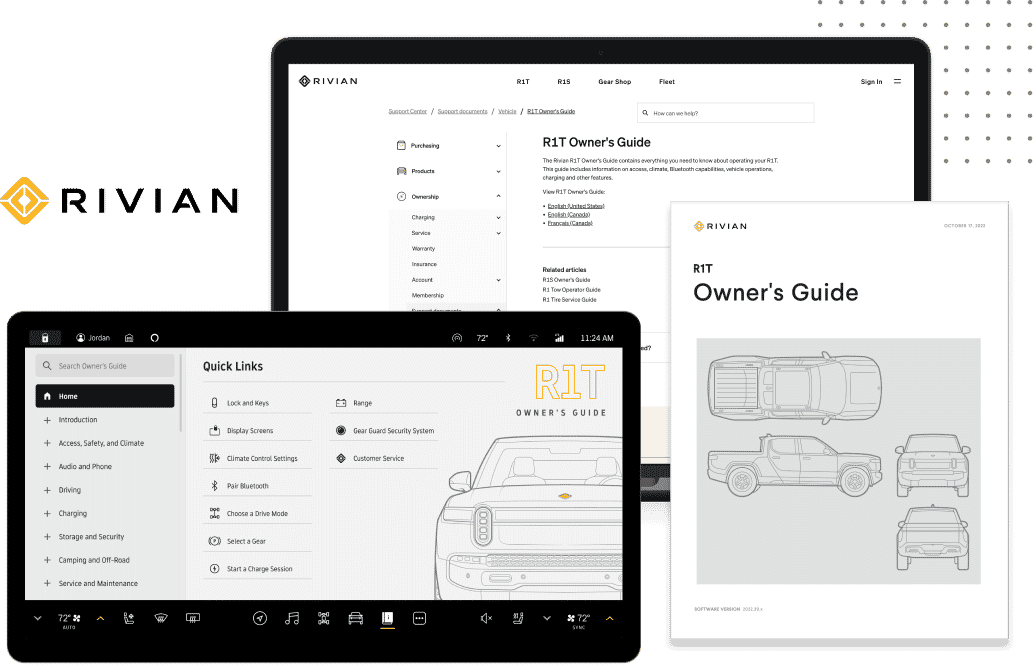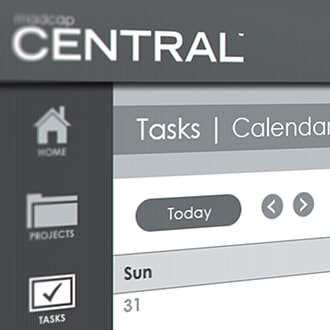This guest blog post was written by Lisa Hamilton, Experience Content Manager at Axiom Law (axiomlaw.com). Lisa is a certified MadCap Advanced Developer and content professional who manages user content and communications for legal technology and cloud solutions. She is also a contributing member and meetup organizer for Write the Docs (an international technical writing community).
Getting timely and thoughtful SME feedback is a common challenge for technical authors. And to that, I say, “challenge accepted”!
If you struggle with getting subject matter experts to review your content on time, or in some cases at all, grab a coffee and keep reading for a better understanding of some techniques that I’ve found to be key to success over my two or so decades as a content professional.
But first, a word about why SME feedback is a critical component of technical authoring.
The Role of SME Feedback in Technical Authoring
Information overload and communication fatigue are familiar issues to most technical authors. It’s hard enough just getting content consumers to read past the headlines. If you manage to do that, congratulations! The next challenge is rewarding them with relevant, high-value, content. This is where feedback from subject matter experts, if managed correctly, can help elevate and differentiate your content from the pack.
Technical authors are experts in the discipline of technical content development. However, we are often tasked with writing about subjects or for audiences that we have limited or even no prior knowledge of. If you aren’t an expert in the subject matter you’re taking on, someone who is can help you build a base level of knowledge by:
- Describing technical details in terms that you and the audience will understand
- Directing you to relevant background information
- Providing deeper audience insights
- Fact checking your articles
Even if you do know a little something about the subject, SMEs can often impart lesser-known nuggets of knowledge, anticipate user questions, and suggest ways to communicate concepts more effectively. As an example, if you document products or applications, these are great examples of things you should ask your SME in order to provide your audience with the highest value content.
ASK THE SME | VALUE |
|---|---|
How it works | New-user onboarding and education |
Problem it solves and for who | Product and feature adoption |
Audience-specific behavior | Relevance |
Pro tips | Efficiency |
Best practices | Desired user behavior |
FAQs | Support ticket deflection |
Things Your SMEs Will Love You For
A technical author’s ability to effectively work and communicate with subject matter experts, such as UX designers, SDK software engineers, database administrators, is a critical and underrated skill of the working relationship. It can take your content to the next level of awesome. But not all SMEs may understand that at first. Being interviewed or reviewing your content could be an unexpected ask. They might not understand why it’s important or how much of their time it’s going to take. Here’s the secret sauce for winning them over:
- Schedule introductory conversations.
- Ask how they prefer to communicate.
- Be an efficient interviewer.
- Implement an SME-friendly feedback process.
- Provide specific instructions with feedback requests.
- Share a tracking sheet or calendar.
- Engage regularly.
- Become your own subject matter expert.
- Across all of the above, make it easy for SMEs in every way that you can.
How You’ll Be Rewarded
Well-managed SME feedback helps technical authors publish content that is trusted and high-value, with more confidence and less stress. How does that translate to you and your audience?
- Trusted content is accurate, complete, and fresh.
- High value content solves problems, anticipates questions, and improves the user experience.
- Timely feedback translates to on-time delivery without the stress of chasing down SMEs
We’ll unpack all of this next.
Guidance for Authors who Manage SME Feedback and Interviews
Getting what you need from SMEs isn’t a perfect science. Be prepared to adapt this guidance to the different ways people work, think, and communicate.
Introductory Conversations
Nobody, including SMEs, likes surprises. So, schedule introductory conversations with the subject matter expert well before you need their help. Even if you already know the SME or have worked with them before, this conversation is to communicate details for a specific content project. This is an opportunity to:
- Describe your content project and why their support is relevant.
- Establish that they have the expertise that you need.
- Set initial expectations about the development process and time commitment.
- Ask about their previous experiences with technical writing and working with technical authors—what went well or not so well—and use that feedback to guide your approach with them going forward.
- Request access to any resources you can consult to begin researching the subject.
- Request invites to other meetings where the subject matter is discussed.
- Proactively address any hesitation or concerns your SME might have.
- Convey the importance and value of SME feedback in terms of how it benefits your users and/or the business.
Communication Preferences
“How do you prefer to communicate?” I’ve found this simple question to be a difference-maker in getting responses from SMEs (and work colleagues in general). So, it pays to ask and it’s generally easy to accommodate. Common channels will be email, Slack, video chat, or other internal communication tools your organization uses.
Effective SME Interviews
Technical authors must master the art of the SME interview. A few tips:
- Provide SMEs with an agenda or advance notice of the topic or topics you want to discuss.
- Don’t assume that SMEs know what information you need. Always be prepared with relevant, targeted questions for the topic at hand.
- Keep interviews focused on topics you can cover in around 30 minutes.
- Do your homework. Familiarize yourself on the subject matter before your interviews.
- Ask clarifying questions and restate answers to confirm your understanding.
- Take good notes so you don’t have to ask the same questions again.
- Remember that you are an advocate for the content consumer, so if it isn’t clear to you, you can’t make it clear for them.
Feedback Process
When it comes to getting and managing SME feedback, “hey can you please take a look at this?” isn’t likely to score points with the SME or get the results you’re hoping for.
As a technical author, you understand that defining, documenting, and following a repeatable process makes things easier for everyone by setting expectations, introducing efficiencies, establishing ownership, and minimizing miscommunications or oversights. I’ve found that most SMEs are happy to adopt your process and document design, especially if it’s clear and simple. However, you’ll likely want to make adjustments to accommodate different SME work styles, preferences and access to review workflow tools. Your process should address a few key questions:
- How will content be submitted for review?
- How will SMEs be notified when content is ready for review?
- How will they provide feedback?
- How will review status be tracked?
For managing feedback, choose tools that you and your SMEs are comfortable with using. The more flexible you are here, the easier it will be for them to provide timely feedback. In most cases you’ll be using one or more of the following:
- Email to send content and capture comments
- Word documents with change tracking or comments
- PDF markup or comments
- Organizational knowledge platforms like Confluence
- Authoring tools that tech-enable review workflows for more responsive content (for example MadCap Contributor or MadCap Central CXM platform)
- Verbal feedback
I also find it helpful to set up a Q&A channel for general SME questions and communications about processes or anything else that comes up. A Slack channel works well for this, especially if you work with multiple SMEs.
Instructions with Feedback Requests
Do your SMEs and yourself a favor and never send content for review without specific instructions. SME feedback should focus on completeness, correctness, messaging, and value—it’s not a copy edit or a proofread. Making this clear will keep them from being distracted or slowed down by minor issues in formatting or grammar. Your instructions should include:
- Exactly what to review for and any specific questions
- What not to review for (anything non-substantive like grammar, spelling, and punctuation) with assurances that it will get a professional edit
- How to provide their feedback (give them a choice if possible)
- When you need it back
- A sincere “thank you” for their time
Tracking
Share a tracking sheet or calendar to show in-flight and upcoming feedback requests if there will be ongoing work. You can do this in Excel, Outlook, Confluence, or whatever knowledge sharing and collaborative documentation tools your company uses.
Engagement
Regular engagement helps build good working relationships, facilitates knowledge transfer, and can drive continuous process improvement. So, how often should you meet with your SMEs? That really depends on what you both want to get out of these meetings, the complexity of the subject matter, the frequency of content feedback cycles, and personal preference. I’ve found that 30-minute biweekly syncs are a good place to start. Your mileage may vary, but you can ensure they are a good use of time by adopting these best practices:
- Share an agenda ahead of the meeting.
- If you’re not meeting in person, use video and screen sharing to keep the sessions engaging and interactive.
- Send a recap of the conversation, including takeaways, action items, and next steps.
Become Your Own Subject Matter Expert
Reducing your dependency on subject matter experts should be a goal if the subject is something you will be writing about on an ongoing basis. The more you know about the subject the less time you’ll spend interviewing SMEs and the fewer feedback cycles you’ll need.
The best way to go about this is by asking your SME for invites to regular or relevant meetings about the subject. Don’t worry if it’s a lot of meetings at first– you can decide over time which ones benefit you the most and drop the others or rely on recordings or notes.
Takeaways
Capturing and managing SME feedback is well worth the effort. If you’ve been struggling with how to do this, the techniques we’ve discussed here will give you a framework to build on and a path forward.










